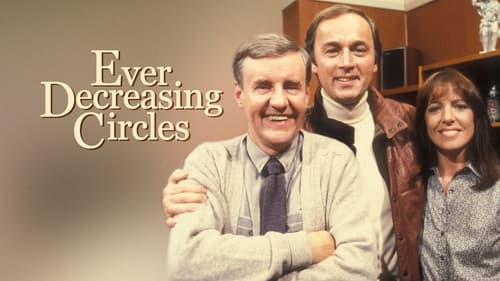Libramedi
Intense, gripping, stylish and poignant
Seraherrera
The movie is wonderful and true, an act of love in all its contradictions and complexity
Sarita Rafferty
There are moments that feel comical, some horrific, and some downright inspiring but the tonal shifts hardly matter as the end results come to a film that's perfect for this time.
Dave
This is a sitcom about middle-class, middle-aged people in suburban Surrey. It was broadcast on BBC One from 1984-1989.The protagonist, Martin Bryce (played by Richard Briers) has obsessive- compulsive personality disorder. In the first episode, Paul Ryman (played by Peter Egan) moves into the house next door to Martin. Paul is more popular and more successful at everything than Martin is - despite Paul not really trying hard at anything. Martin's jealously of Paul and the resentment he feels towards Paul as a result of that is prominent in every episode.
stubbers
I don't quite know how I stumbled across Ever Decreasing Circles again, over twenty years since it was made. But having rediscovered this sitcom, I have watched several episodes and frequently find myself rolling around in laughter at Richard Briers' character Martin Bryce."Ever Decreasing Circles" deals with the relationships between Martin, an an obsessive, neurotic control freak, his lovely wife Ann (Penelope Wilton) and neighbour Paul (Peter Egan). The humour mainly derives from Martin's laboured, heavy-handed attempts to organise everything from bingo games for old ladies through to football matches for 11-year olds. Up in the box-room of his house Brooksmead, Martin has reams and reams of paperwork detailing all the numerous committees and teams that he manages, plus his beloved duplicating machine.In contrast, neighbour Paul has effortless charm, he has friends left, right and centre that he can call on to do favours for him, and he is better at everything than Martin. This leads to a brilliant comedy of frustration, jealousy and bitterness as Martin finds himself thwarted and humiliated by Paul at every turn. Paul never really intends to demean Martin, the frustration normally stems from Martin's own ridiculous attempts to try and get the upper hand.One example, from many: Martin is organising a dance. His most loyal friend Howard comes up with the bright idea of a Vicars & Tarts theme, Martin is impressed and enthusiastic until he finds out the idea actually came from Paul. At every step of the way in the planning, from the catering to the band, something goes wrong with Martin's attempts to organise it, with Paul eventually having to phone up his mates to help resolve each problem.But Martin thinks he has the last laugh. His wife Ann realises he is up to something because he is unnaturally gracious to Paul after the dance. Martin boasts to her that the editor of the local newspaper will mention Martin's name 18 times in the write-up of the dance, whereas Paul's name will only be mentioned once, and misspelt at that. Ann asks why a reporter would agree to do something like that, to which Martin replies with glee: "I blackmailed him!" The reporter's son plays for the football team Martin coaches, and if he doesn't write up the story to Martin's satisfaction then he will drop his son from the team.I didn't really do the above plot justice, you have to see the episode "Vicars & Tarts" to really appreciate how funny it is! There are also some utterly hilarious scenes where Martin kicks his bed in an angry fit of class-envy about how easy it is for some people in life (ie Paul).Despite the middle-of-the-road suburban setting, there are very subtle hints of a more subversive, satirical nature to "Ever Decreasing Circles". Martin is hellbent on keeping "his" Close a pleasant place to live, but the bureaucratic way he tries to enforce his rules, plus his self-proclaimed role as leader of the Close, does seem like a gentle prod at a certain kind of authoritarian attitude. In one episode Martin even wonders aloud if maybe a benign dictatorship is the best way to achieve things. By contrast, Paul represents an upper class, slightly untrustworthy, playboy type.In fact, dour Martin Bryce could almost be Gordon Brown, whereas Tony Blair is more like slippery charmer Paul. One imagines similar bad-neighbourly exchanges occurred in Downing Street several times throughout the 90s!
nrt-4
Sorry to see this excellent series damned by faint praise in another review. A quiet home-counties close is the setting for some complex characters and relationships, brought out superbly by the principals, Richard Briers, Penelope Wilton and Peter Egan. Admittedly, Howard & Hilda were a bit two-dimensional, but that was kind of the point.While stopping short of biting satire, it nevertheless touched nerves in suburban households in much the same way as the first Reginald Perrin series. The ability to make a character like Martin Bryce likable (well, occasionally) highlights the consummate skill of Briers, who has ranged from farce to the RSC with equal ease. At first it's hard to understand how the wonderful Anne (Penelope Wilton) married him, and yet eventually you see how it could happen. A poignant and very English comedy that should see the light of day again.
DarkHelmet-1
This show is basically a tour de force for Richard Briers as Martin, the ultimate control freak. Penelope Wilton, as Ann, and Peter Egan, as laid-back neighbor Paul, are also terrific. Howard and Hilda are too boring, though. This show never fails to make me laugh and I thank PBS for running it as long as they did.

